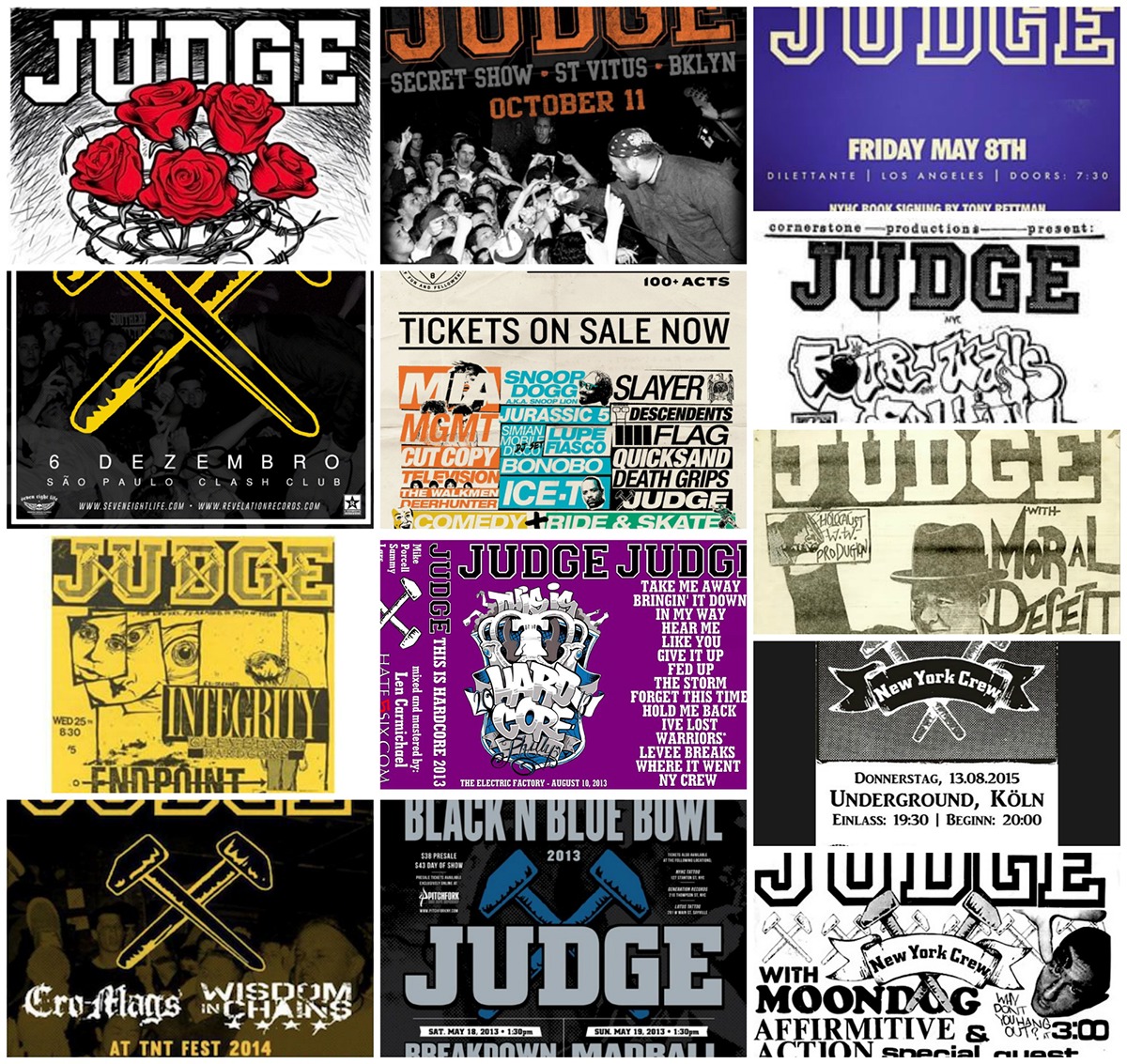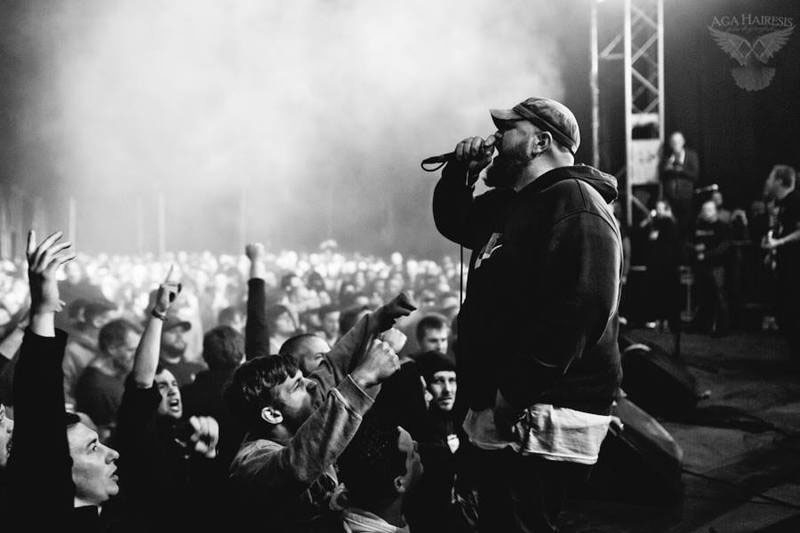
VICE's music channel with daily news, video, and reviews that aren't boring. Noisey birthed in 2011. Since then, the website has grown into one of the smartest, sharpest, and most dynamic music hubs on the planet—continually breaking the mold and defining music coverage in the evolving media landscape. Noisey.com itself reaches millions and millions of readers and subscribers a month, a must-stop source for new music, investigative journalism, and artist-sourced content. But more than just storytelling, Noisey understands the culture in which we live, throwing popular parties and shows worldwide, hosting online listening parties for new records, discovering the freshest and most exciting artists, and producing videos for today's most innovative and creative musicians. Fans come to us not only for everything vital in the realms of rock, rap, metal, and punk, but to understand how to think about those worlds. LAUNCHED: JANUARY 2012
THERE WILL BE QUIET - THE STORY OF JUDGE
Noisey's 4 part series There Will Be Quiet: The Story of Judge, we talk with mythical NYHC vocalist Mike Ferraro, better known as Mike Judge. Ferraro recounts his early days and unforgiving upbringing, his road toward straight-edge, and how an introverted kid found his way to punk rock.
This four-part series ’There Will Be Quiet - The Story of Judge,’ Mike Ferraro emerges from the shadows twenty years after the dissolution of Judge to reform for the biggest hardcore festival in the world, Black & Blue Bowl. Judge is greeted by two triumphant and sell-out nights and some of the most rabid fans in the world.
If you had to put your finger on a moment when Mike "Judge" Ferraro, singer of straight-edge band Judge, figured he was done with hardcore, it might have been just before the band's final song during a concert in Ybor City on their 1991 tour.
There are shouts of "white power" early in the set, now posted to YouTube, and later a group of morons gangs up on an African-American audience member. This came in addition to the violence that was by then expected at Judge shows. It was ugly. "Since when does six guys on one old guy prove anything, man?" he asks from the stage. "Can't you guys come to a show and have a good time?" After some tuning, he says, "All right, this is the last one, so have fun," just before the band — who all look pretty drained at this point — bang into the opening chords of "Take Me Away."
It was just one show on a tour where during several stops it seemed like meatheads wanted to either fight him or have him fight somebody on their behalf: On one occasion, somebody called the house at which the band was staying and asked if he could come beat up KKK members holding a rally in the city that day. The mystery about the icy, introverted frontman sprouted rumor after rumor during the years before the immediacy of Twitter and Instagram.
After that tour, the band broke up and the young man now known as Mike Judge, who had been a scene fixture since he was fifteen and went by Mike Ferraro, dropped off the map. While most bands slowly fizzle out, Judge stopped cold. No reunions during the Nineties youth-crew revival, no early-Aughts festival gigs, no final shows before CBGB closed.
"I just had to walk away for a while, and it just so happened that 'while' turned into something like twenty fucking years," Judge told the Voice recently over the phone from his house in Montville, New Jersey. It didn't start like that for Mike Judge, though. New York City and its thriving hardcore and punk scene in the early Eighties was a dangerous, electric place for teenagers and young people to visit from the outer boroughs or New Jersey or Connecticut. It was an energizing environment wherein the teenager quickly found the identity he had been seeking.
In There Will Be Quiet: The Story of Judge, a documentary released in four parts by Noisey and exclusively premiered by the Village Voice above, Judge pulls back the curtain on the band's tumultuous history as well as his own.
Directed and produced by Seth Lowery and former Judge drummer Sammy Siegler, the hardcore vocalist goes into the trauma of his childhood, and his life before, during, and after Judge, all of which made him appear as a rather mysterious figure in alternative music.
See also: Read excerpts from NYHC: New York Hardcore 1980–1990 by Tony Rettman
Those who only know Judge's music might be surprised to learn that the singer, who famously joined a motorcycle club after his band — and who would sometimes opt for fists over words — is open, thoughtful with answers, and wont to warmly tack "brother" on to the end of sentences. Now 49, he has mellowed a bit since his enraged twenties, not that he's given up the straight-edge.
"No, never," he says when asked if he experimented with drinking or drugs after leaving the band. "My whole family has been devastated by it in one way or another."
Coming in at a little over 60 minutes, the documentary can be, Mike Judge says, a "brutally honest" film. Included are his stories of seeing drug use by extended family members, sexual abuse, alcoholism, violence — even being left on the street by a relative in the Bronx during the 1977 blackout. The result is a dramatic, personal portrait of Judge, where before there was only rumor. Mike Judge lays bare his demons.
"It's just another way to show kids growing up, who don't fit in, maybe they're not popular in school...I'm not the brightest example, but I did all right," Judge says of his participation in the film. "I was so introverted. I hope people can see that when you're like that, it's not the end of the world."
As a freshman in high school, he would make the hour-long trip by bus from rural Jersey to the Port Authority and then to the Lower East Side for punk shows (he also notes he'd pick up the Voice in New Jersey to find who was playing when).
"It was like a super-big deal to fucking go down to this little convenience store, and we would go and open up the Village Voice, and they would have those [advertisements], the skinny strip, and it would have, like, the week's worth of shows," Judge says. "That's how I found out everything. We'd make a weekly run into the EZ Shop for the Voice to plan out our week."
He eventually joined bands Death Before Dishonor (singing, then drumming), Youth of Today (drums), and, finally, Judge, which he formed as a reaction to the heckling and beer bottles thrown at Youth of Today while the straight-edge band was on tour. "People are bad-mouthing straight-edge, so we should just get in their face," as Judge guitarist John Porcelly put it.
Judge released the New York Crew EP in 1988 on Schism Records, followed by the Bringin' It Down LP and, finally, theThere Will Be Quiet... EP. Along the way, they released what would become one of the most sought-after hardcore records, the extremely limited Chung King Can Suck It LP, created from a studio session the band didn't like and limited to just 110 copies and six test presses. That was it.
The band's live shows grew increasingly big and sometimes violent, as their music took on a more metallic sound. At the height of their notoriety, or maybe infamy, Judge quit. "When it all came down at the end, I realized that I wasn't going to be able to stop what I put in motion years before," Judge says today of all that negativity surrounding his band. "That just broke my spirit." In a separate, unfinished documentary about the band posted to YouTube, Porcelly says, "I think Mike took it harder than anyone else" when asked about the violence at shows that got way out of hand.
"I felt responsible, big-time," Judge says in that separate doc. "These kids were going nuts and they were fighting and they were singing Judge lyrics right to me. Every word I ever wrote was thrown back into my face."
"You'd see all these kids that would be beating the crap out of other people," Porcelly says. "People had this whole misconception that we were a tough-guy band. I was never into that.
"I wanted to break the band up because at that point it seemed too overwhelming to me to correct the situation," "Judge says.
After their breakup, Judge became the straight-edge band for a new generation of fans who sought something heavier than the punk sound of Minor Threat. Meanwhile, Mike Judge went on to release an EP of Neil Young–inspired songs with Judge roadie Todd Schwartz as part of Mike Judge & Old Smoke in 1993 — he says he's open to releasing more acoustic music at some point, but doesn't have any definite plans.
"I was always watching from the outside because that whole [hardcore] scene, that music scene in New York was such a big part of my life," Judge says. In the fall of 2011, Mike Judge was invited onto the Black N' Blue Takeover on East Village Radio. "I had never been on the radio like that," Judge tells the Voice. "I would love to talk about old New York and those bands that no one really talks about anymore." Talk of a reunion sprouted, and the band eventually picked up where it left off. Two reunion showswere planned for May 2013 at Webster Hall. Judge went on to tour Europe and South America, and U.S. cities, and is still an active band, playing the odd festival date here and there, with Seattle's Rain Fest up in May, then festival appearances in Atlanta and England in August.
Mike Judge says another New York City show is in the works for this year, but won't go further than that. After all, it would appear, he's kept some of the mystery intact.
See also: • The Best New NYC Hardcore and Punk, January 2015 • The Ten Best New York Punk Releases of 2014 • East Village Nights: An Excerpt From NYHC • What is NYC Hardcore's Legacy? • The Top 20 New York Hardcore and Metal Albums of All Time
[nlucchesi@villagevoice.com][@nicklucchesi]


Photo by: Aga Hairesis
